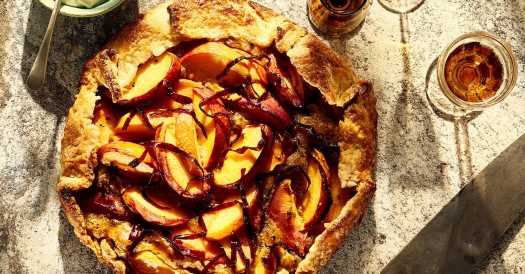It’s such a short window, when peaches are ripe enough to eat just as they are, so it’s tempting to elevate this complex, floral fruit: to wax just a little bit too lyrical. Notes of vanilla are present, traces of almonds. Echoes are heard in chardonnays and rieslings, sémillons and proseccos. But a perfectly ripe peach activates all the senses.
Recipe: Peach and Chile Galette With Pistachio Frangipane
Some of us get so inspired as to name entire cookbooks after them. The acclaimed author Diana Henry’s “How to Eat a Peach,” whose cover itself is as fuzzy as the skin of the fruit, takes its name from a memory of eating out in Italy. For dessert, the table next to her had just a bowl of peaches and a bottle of chilled moscato. Peaches were sliced; slices went into the wine. Wine was drunk; peaches were eaten. The scene was seasonally, sensationally, simply perfect.
Others, as anyone who watched the relationship between Timothée Chalamet and Armie Hammer play out in the film “Call Me by Your Name” knows, take the perfect-peach moment still further. In the characters’ case, quite a long, sensual way further. You’ll have to watch the film, or read the wonderful novel by André Aciman on which it is based, to find out more. Enough to say, all senses are duly activated.
It’s all very August, all very Italy, all very wonderful. And yet, for all that these moments crystallize the nature of the perfect peach, how many times a year does a “perfect peach” actually happen for us? Once? Twice, maybe?
Heat and sugar lend underwhelming fruit a helping hand.
At all other times, we have to settle for a little less than perfect. This is when cooking comes along, giving the peach a bit of help to draw out the sweetness. Heat and sugar tend to do the trick, in one way or another. In this galette, for instance, it’s 35 minutes or so in a hot oven and a coating of sugar syrup, which teases out the magic. Bring this to the table, and your peaches will undoubtedly get a show-stealing, summery “Wow!”
Still, I think about what happens once summer starts drawing to an end, after all those brilliant peaches enjoying the limelight and the sunlight. In my galette, it is actually under the peaches, hidden away, where so much of the basic, practical work takes place. In the kitchen, as in life, so much is just about the plain old nuts and bolts.
The nuts, in this case, are pistachios and almonds, the unsung heroes of cooking. Whether finely ground, roughly chopped, thinly sliced or left whole, they’re there in so many of the dishes that make me happy, come rain or shine: from the almond croissants we treat ourselves to as a family on the weekend to the German Lebkuchen — Christmas cookies — we eat when times are festive. They’re in the French financiers and macarons I love to make (and eat); thinly flaked and toasted, they’re sprinkled over many a pavlova. And so on, and so on.
It’s true of savory dishes, too. Soups, stews, sauces, spreads, sprinkles: Nuts do the work in so many of my favorite iterations. They give body and a deep, rich flavor.
So that’s how the initial thought of peaches and the warm August sun gives way to the everyday: the nuts and bolts of the unrecorded, unfilmed, undocumented life. All the parts that do so much of the work to keep the show on the road: They’re just as vital — if not more so — than the sunny stars.
Recipe: Peach and Chile Galette With Pistachio Frangipane
Yotam Ottolenghi is a writer and the chef-owner of the Ottolenghi restaurants, Nopi and Rovi, in London. He is an Eat columnist for The New York Times Magazine and writes a weekly column for The Guardian’s Feast Magazine. More about Yotam Ottolenghi
Source: Read Full Article
